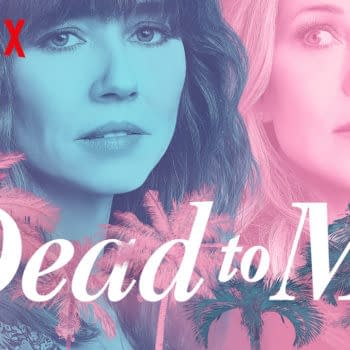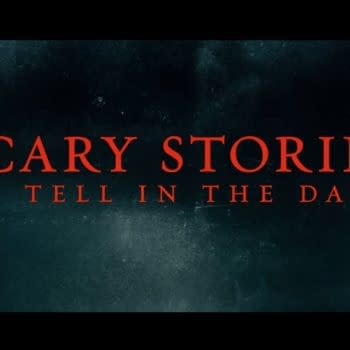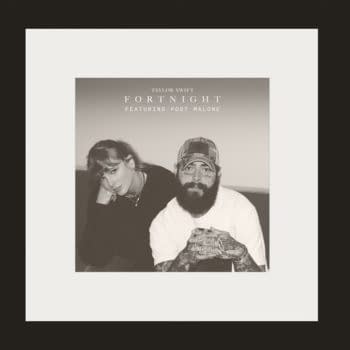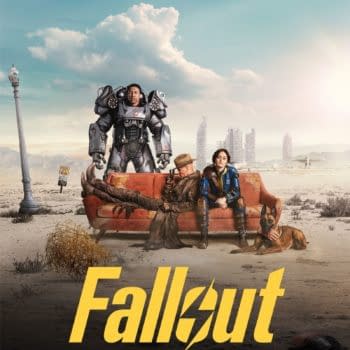Posted in: HISTORY, TV | Tagged: chainmaille, costumes, History, History Channel, Holy Grail, HRL, interview, knightfall, Templar Knights, Templars, Tom Cullen
'Knightfall' Star Tom Cullen Talks Crusaders and History
History Channel sure has been branching out into scripted drama territory. What once started with Vikings continues with Seal Team Six and the newest series, Knightfall. The first episode of the series centers around the fall of the Templar's last stronghold city in the Holy Land Acre, where the Holy Grail is lost during an attack and subsequent retreat.
We were lucky enough to be included in a phone interview session with Knightfall star Tom Cullen (Downton Abbey), who plays Landry, the Templar Knight who is the focal character in the show. All the questions were asked by other outlets (I never got the chance to get my question in), and Tom was a wealth of insight into the series and his process.

Q: What was your favorite thing about filming [the show]?
Tom Cullen: This is the kind of project I've always dreamt of being involved in ever since I was a little boy. I grew up in Wales and I grew up next to a castle. That kind of history is really woven into the fabric of my DNA like I think it is in many Europeans' DNA. And when I was a kid, my dad gave me this wooden sword and shield and I used to go up there with my mate and we just used to run around pretending to be knights and warriors.
I think that the older we get, the more baggage we carry, and I know that I spent a lot of time pining after that kind of innocence. And so this job really opened up the gateway to accessing me as a kid again. It felt like every single day I had little Tom next to me swinging a wooden sword around with his mates in a castle in Wales. That was my favorite thing about the job; being able to have as much fun as I had while filming this show, and I loved it.
Q: Did you have to do any extra training for that, or had you already known how
to use the sword?
Tom Cullen: In drama school in the UK, we do a lot of fight training. And so I'd done a lot
of sword training prior, and I found that I had the propensity for killing people, ironically (laughs). So I'd actually done extra exams and had some practice while studying in drama school, but that was about eight years ago. So I hadn't swung a sword in about eight years, so it was all very new in many respects.
And the stunt team that we had was led by an amazing Frenchman, Cédric Proust. He is a top stuntman and fight choreographer. He really put us through it and we had a great swordsman called Roman. The entire team wanted us to be at a very, very high level. So every day on set they would drill us and I did about three months of physical training beforehand to get myself and my body ready for the fighting portion of my character and the series.
We also did a two and a half week boot camp where we would walk in the morning and do some circuit training and then do fighting in the afternoon. Later, we'd go horse riding and do some more sword training and then we would go to the gym. When it came to the actual filming — because there were a lot of fight scenes — I was filming 14 hours a day doing scene work, and then I'd have to do my fight training either on my lunch breaks or on the weekends. Any kind of second in the day that I did have I would fill it by going up to the stables and ride.
Working on Knightfall was a full-on experience because the team wanted it to look authentic and real, and when you watch the fights, they are absolutely incredible. I'm so proud of all of the actors who've participated in the battles because we've really done a great job. The stunt guys have really trained us well, and they're epic battles, and muddy and gruesome. And they feel very real, which I think is something I'm very proud of.
Q: Did you do any other preparation for the role — did you read any books or do any research? Did those things help you get into the role, as well?
Tom Cullen: Yes. Whenever I have done a historical piece, I think it's imperative that you
have to bathe yourself in as much literature to understand the world as much as possible, so that when you get onto the set, the world is just vibrating inside you. So I wanted to know as much about the crusades and about the politics at the time. Not just the politics in Europe or in the Middle East, but also Mongolian politics, because they had a huge influence.
And so you just need to immerse yourself in the world and know everything that these men would have known; understand every single permutation and the political permutation that has affected where they reach. [You have to understand] where they are at this point and what drives these men and women to do the things that they do.
I think that's something that you have to do, otherwise it's just lazy and in a way unforgivable because at that point that's where you make mistakes. And you take history for granted, and history should never be taken for granted. It's essential for us furthering ourselves as a society and as a culture, because the one thing that history teaches us is that it's cyclical. And so yes, I read a lot, and we had a fantastic historian on set. His name is Dan Jones. He's just released an amazing book that you must read called The Templars, which is on the New York Times Bestsellers List; it's brilliant. And so he was there on hand at all times feeding into us and making sure that what we were portraying was as accurate as possible.
So anything that would come up in the script that we didn't know, we would use him as a source of knowledge and he would say, "Go and read this, go and read that," or just tell us because he he's a real fountain of knowledge. And that wasn't just the access that put me in the world of the Knights Templar. Like I said, the costume design, the art direction, the production design, makeup, etc. — it was all so dense and real that you're feel like you're right in it as soon as you turn up on set. It's just all there for you, you know, and you can really immerse yourself into the world.
The days we spent on set were amazing. We filmed on the biggest sets in Europe at Barrandov Studios. They built medieval Paris. I've never seen anything quite like it, and in the show I have to do this shot where I'm riding down this nearly 200-meter-long street that they built. And there're 350 extras and each extra has a job, each extra has a name. And it's a live, real world, and you just forget that the cameras are there because it's so extraordinary.
And our costume designer, Diana Cilliers, was amazing. I remember the first time we did our screen test, which is where you put on the costume in front of camera and you kind of, like, pose and walk around, so they can see what it looks like on camera with the makeup and the hair and all of that kind of stuff.
And I remember putting the costume on, the chainmail and everything, and it weighed 50 pounds, which was an insane amount of weight. And I struggled to walk down the corridor to get to the studio to do the screen test. And I was like, "Guys, why is the costume so heavy? How are we supposed to move and fight in this?" And the answer was that Diana tried out lighter material such as plastics and other materials, but they just didn't look authentic. And so they put us in the most authentic costume that they could and we just had to deal with it. And we got bigger and we got stronger, and so very quickly we were able to run and jump, [and] get on horses in the 50-pound costumes and do everything that we needed to do to play our parts.
But, you know, you can see the difference in way that the costumes move and the way that your body moves in them. It's just authentic, and I think it makes for a very real experience when watching the show.
Q: There is a lot of religious strife going on in Knightfall. In the first episode, Landry does prevent a massacre from occurring despite religious differences. Can you talk about the religious views in the show and what you think it has to say about our times today?
Tom Cullen: Well, I touched on it a little bit when talking about the history. And the one
thing that history will always do is prove itself cyclical and that human beings have very short memories. We forget very quickly what we've already been through, and we tend to make the same mistakes. And so I think it's really important to remind ourselves of those mistakes.
And of course, you know, Knightfall is a show that is about the Templars, and you'd be remiss to not talk about the holy wars. Though the show actually doesn't take place during that period of time, it takes place 15 years after the holy wars. The show is about the Templars being disbanded and rounded up. That's essentially what the show would be over three or four seasons.
But the Templars were a very interesting group of men because they were founded to protect pilgrims on the road — that was their purpose. Not to fight wars, but to protect people who were going to pray and they were very respectful of all faiths. There is a very famous story of (unintelligible) being held captive in the Templar temple. And they made space for them so that they could pray with ease and they gave them their space because they respect faith.
They're a very interesting group, and I think the show touches on what faith is and how faith can be manipulated to one's own needs and how faith is often used for political games, which is something that has nothing to do with religion. And the Holy Grail in our show is used as a pivot of power in which people circle around it and use it in order to gain political favor.
And that, for me, is really a very interesting world to live in. It doesn't pit religion against religion, but it talks about how religion can be manipulated to man's want and need for power.
Q: Is there any theme or aspect that you thought would resonate with the viewers the most and keep them coming back for more?
Tom Cullen: Yes, sure. I think what I'm very proud of in the show is that you can kind of look at the show objectively from the outside having not seen it and say, "Oh, this is about guys swinging swords and that's what the show is about," but the show is so much more than that. The show is about politics. We have a lot of stuff that takes place in the French Court at the time, dissecting, and breaking down the politics and the machinations of political interplay. I just love that kind of stuff.
And it has a fantastic central spine through the show; an amazing love story. I'm surprised at how strong and moving that story was as we were filming it. And it kind of grew into this thing that we had no idea it would become. The show talks about revenge and betrayal, brotherhood, loyalty faith, humanity, and mortality. And I think that it raises really big questions about who we are whilst at the same time being really kind of fun and entertaining. So that takes you on a really wild journey.
And so I truly believe the show has something for everybody. I think that it is by no means a gendered show. I think that women would love it as much as men will love it, and that is something I'm really proud of, too. It has fantastic strong female characters. They are actually probably stronger than all of the male characters, and they're just as complex and rich as the male counterparts, and it's very moving. I've watched the last episode three or four times now and I've shed many tears every single time. It's a great rollercoaster.
Q: You said that you choose roles that scare you a bit. Was there was something that scared you about this role, or was this just for fun?
Tom Cullen: There's so much that scared me about this role. The size of it and the responsibility of playing a lead in a show as big as this — it was terrifying. But also just the physical and emotional commitment that was required to make this show work. If I wasn't committed 100% to the show, it wouldn't work. They really, really put me through it in the best way possible, making sure I became the best Landry I could be. That was a terrifying challenge and terrifying to have to pull off.
I was learning new skills like horse riding and fighting. And the biggest thing that was terrifying for me was that — and this is something that I've been dealing with my entire life — I was doing something that I love. I read the script and I wanted it so badly because I thought it was so good. That really terrifies me.
I'm much more comfortable in that way. I come from a poor area of Wales where I'm much more comfortable with rejection than not. And so what terrified me was that I wanted to do it, and doing something that you love and that you want is often the scariest thing that you can do — because if you fail at it, that's a big journey to go on.
Q: And when will you start promoting the chainmaille diet?
Tom Cullen: I've already started doing it, man. Seriously, the chainmaille diet is a real thing. If you want an ass like Kim Kardashian (laughs), wear chainmaille for seven months, 14 hours a day, and it's guaranteed. Just walking upstairs, you're squatting. It's amazing.
Q: Can you talk about how these garments were made, and what were some of your favorite things to wear and what they looked like in person?
Tom Cullen: Yes. Unfortunately, I only ever had one costume, really, which is either with chainmaille or without chainmaille — but most of the time with chainmaille. But Diana made it so that it was completely authentic, even in terms of the undergarment underneath the chainmaille. So we had a very, very thick heavy muslin underneath, like a linen dresser with leather underneath, and then the same on our bottom half as well. The chainmaille was real metal and so it gave that kind of weight and movement to it.
The tunics were made in the same way that they would have made the fabrics back then at the time. And with the things like the crosses, they spent a lot of time discussing what cross to use. Templars used many different crosses depending on where they were based, and later in the series, we meet another group of Templars and they have a different cross than what you see me wearing.
And Diana talked about how they would have died — the wreaths, the crosses, and how they would have stitched them and sewn them on, and how the draper would have done it. They talked about your mom doing it, like, for when you're going to school — it isn't completely perfect — and I love the attention to detail. They stitched in the same way that they would have stitched then. And so they had a huge workshop at our studios, Barrandov Studios in Prague, with the most incredible costume teams who worked tirelessly. I don't think people realized how much work it took, because I certainly didn't realize it.
When you have 400 extras on set, the costume team starts work at 2 o'clock in the morning to start dressing all of these men and women so that we're ready to start filming at 7 a.m. And then they wash all the costumes and they go to bed at an insane hour and they do it in shifts. The work that goes into making 400 beautiful costumes is unprecedented. In terms of the court costumes, I was really jealous because their costumes were incredible.
And Queen Joan and Princess Isabella played by Olivia Ross and Sabrina Bartlett, their costumes were inspired from real medieval images and fabrics that they had used and they are just unbelievable. Like, every time I saw Olivia, she was in this new extraordinary costume that Diana fashioned and created out of seemingly thin air in no time. And they're just stunning, stunning, stunning works of art, really.
But what is amazing is that the way they were made is the way that they would have made them back then. And Diana was really collaborative, as well. I think each of us wanted to have our own unique way in which we wore our costume or we wore our belt or the color of our cross. And so she allowed me to choose the color of my cross and how I would have dyed it. And we talked about how they would have washed their clothing and how dirty they would have been. Diana and I found this article about how The Templars would have kept their tunics white. They would have washed it in urine and chalk and then hung out to bleach it on the line. All of that really detailed history and information about The Templars is fascinating, and we loved going there and making it as authentic as possible.
Q: Earlier you mentioned the love story. Landry became a Templar at such a young age; do you think that's why he was able to rebel against that part of it and enter a relationship?
Tom Cullen: I think that when we first meet Landry at the top of Episode 1 he is 20. And he is brash and young — he is a maverick, incredibly cocky, and is kind of emboldened by the fact that he has God on his side. He thinks that he's invincible, which I think a lot of 20-year-olds think, regardless of whether they have God on their side or not. I know I certainly felt like that.
But what we see at the top of episode 1 is his entire life flipped upside down when they lose Acre, the last Templar stronghold in the Holy Land and they lose the Holy Grail. And so we flash forward 15 years and when you've been brought up as a as a warrior, and that's all you know — everything you know — it's a tough reality to deal with. And so he's like a caged animal, unable to fulfill what he thinks is his only purpose and duty which is to fight.
And so when we meet him, he is this very, very complex, pulled apart guy in episode 1. He is battling with his humanity and he is secular yet he is also still mentally devout. He is very loyal to his brothers, his family yet he is lying to them. He is having an affair with a woman yet he is a monk. He is the bravest, most fearless warrior, yet he's starting to feel a sense of his own mortality.
And I think that's why he kind of falls in love with this woman. It's not that he's doubting God or that he's doubting the Templars or religion, but that he's doubting himself. He is in a conflict, in a battle with himself, which are the stories that I love to watch where your hero is so full of contradiction and battle and personal complications. And throughout the first season, we see him work through that and battle through that and try and find out who he really is. And it's an awesome journey for me to play and to take viewers on.
* * * * *
Thanks again so much to those awesome folks at History and A&E for the opportunity to take part in the interview; the series is truly epic. Can't wait to see how it progresses throughout the 10-episode first season.
Knightfall premieres on the History Channel on Wednesday, December 6th, directly following season 5, episode 3 of Vikings.
















